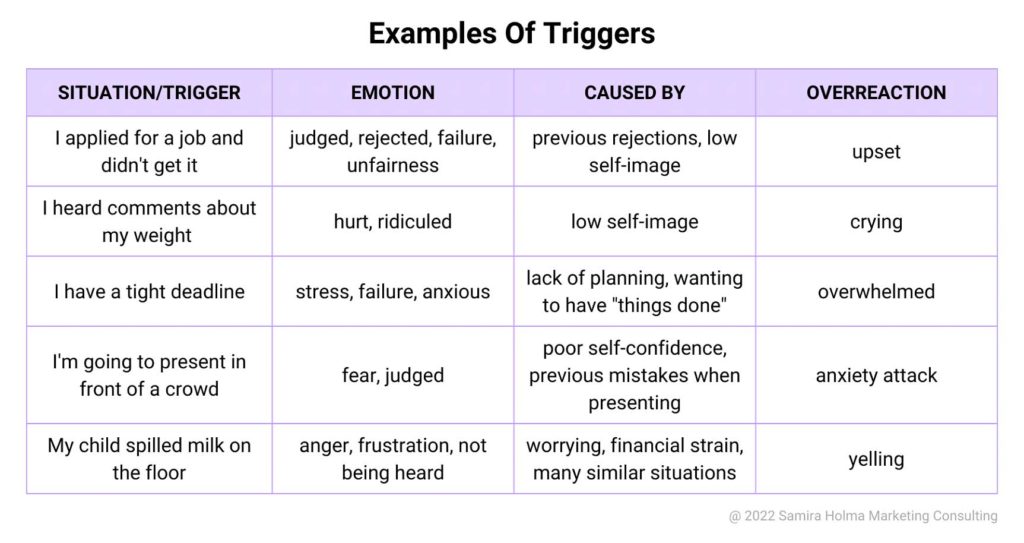When people or things push your buttons it may not always be possible to react as the emotionally intelligent beings we like to think we are.
However, there is no shame in feeling intense emotions, nor in needing help to cope better with them.
Managing our emotional triggers is a powerful opportunity to look into the mirror, see what’s being triggered, and heal ourselves in the process. We can choose to change and take on life’s challenges with grace. While it takes effort and self-awareness, it’s key to create the quality of life you want.
What Are Triggers?

Photo by Johannes W on Unsplash
Triggers are something that set us off and cause overwhelm or distress. Triggers can be words, gestures, a story we read, a comment made, or even just bad traffic congestion!
When we’re triggered we often overreact. You may feel angry, disgusted, sad, anxious, or as if you’re “losing it”. You might also experience increased heart rate, dizziness, and even nausea. As a result, starting an argument, throwing out a mean comment, shutting down emotionally, or being aggressive can seem like a good idea. A recent example is Will Smith slapping Chris Rock at the Oscar’s, with being banned for 10 years as the result!
Triggers scratch open raw wounds from our past. While it is normal to feel these things, triggers can cause unnecessary drama, if we are not prepared to deal with them.
Why Do We Get Triggered?
Being triggered is a defense response to what’s going on right now. Triggers are built on stories we tell ourselves based on unmet needs and past experiences.
As kids or young adults, we have all experienced hurtful or abusive moments. Many traumas were too much to process or let go of at the time as we were still developing. Since we didn’t know better, we’ve created stories that we continue to believe in. We even subconsciously attract relationships and experiences that validate these.
These stories become a part of our internal belief system and shape the way we view and respond to our world and everything around us. Friends, family, partners, or someone you barely know can say or do something that reminds you of trauma from the past. As you haven’t learned to deal with it properly, you just react!
You want to avoid the feelings (such as loneliness, abandonment, etc.) connected with what you’re experiencing (like being rejected, being disliked, etc.). This often happens in the blink of an eye without you even being aware of it.
Getting Triggered Only Backfires

Photo by Yoann Boyer on Unsplash
Being triggered is a vicious, destructive cycle that has many ripple effects. Including constant overreaction and recovery, unnecessary stress and drama, shame, loss of trust, relations, and ultimately, the control of your life.
The key to overcoming your triggers is understanding them better. Stop avoiding them, start identifying and feeling your way through them. Once you do, you can heal, because you’ll no longer be reliving the trauma or hurt that caused the trigger to begin with.
Let’s dive into the 3 best ways to ditch your triggers and take back the control of your emotions.
Use this free worksheet to work through your own triggers as you’re reading this article. Note: It will open in the same tab.
1. Break The Hold: Identify Your Destructive Triggers
Identifying your triggers allows you to understand and deal with the real issues behind them. Once this becomes clearer, you will realize that they’re not real; they’re just a distorted perception of what’s real! Even if the emotions you have are valid.
To help you identify and understand how your triggers work, let’s take a quick look at 5 examples of emotional triggers, and how to easily spot them as they happen.

When broken down like this, it’s easy to see the role that triggers play in our responses:
- The situation calls up an emotion, often caused by something said or done.
- The emotion is already present and simmering because of past experiences and the way we’ve been speaking negatively to ourselves about it. Therefore, it’s easy to overreact.
Use the worksheet to identify your own triggers.
2. Detach Yourself From The Emotions

Photo by Radu Florin on Unsplash
When you have an overview of your triggers, say goodbye to the destructive beliefs you’ve adopted, instead of letting them get the best of you.
Detaching is also known as letting go. That’s not to say that you let go of the way you were hurt, but rather that you release the pain associated with the memory of what hurt you.
Show compassion for yourself. Understand that you don’t have to carry around unprocessed pain of the past. Forgive yourself for the role you played in what happened to you. Understand that you were a victim at the time, but you aren’t anymore.
The following questions can help:
⦁ Why did this feel wrong to me?
⦁ What other situations have I experienced that could contribute to how I’m feeling?
⦁ Is this situation really as bad as I’m imagining it?
3. Taking Back Control With Healthier Responses

Photo by Sydney Sims on Unsplash
Once you’ve identified your triggers and started to eliminate the negative emotions they evoke, it’s time to develop healthier coping methods. Taking ownership of the way you respond removes the power from the person or thing you gave it to when you were triggered.
Imagine you wanted to quit smoking. You would have to replace that habit with another less harmful ritual, like taking a walk, writing in your journal, listening to relaxing music, etc. These are all positive behavioral changes. Overcoming your triggers works in the same way! We replace the harmful things we tell ourselves (even subconsciously) with more positive wording.
Use the worksheet provided to replace the old stories with new, more vibrant, and positive perceptions. These questions can help you process your triggers in a healthier way:
⦁ What can I do to lessen the effect this situation has on me?
⦁ What language can I use to rephrase the self-criticism I’m hearing now?
⦁ Zoom out from yourself! What advice would I give to a good friend in this situation?
⦁ Rather than following old patterns, how can I react instead?
Inspiration On To How To Change The Way You React Emotionally
As you’re starting to challenge old behaviors and test new ways, re-evaluate how you’re doing on a regular basis. Give yourself credit for small milestones, such as being able to handle a situation which used to get you out of balance with ease.
Key Takeaways To Overcome Your Emotional Triggers
To put yourself back in control, acknowledge that the only thing that needs to change is you. You can do this by regulating your responses to the situations that trigger you. But first, you need to identify those situations and see them for what they really are.
Emotional regulation is a skill that can be learned and developed. It teaches you how to be more tolerant of your own and others’ shortcomings. It enriches your relationships by increasing your empathy and compassion for others. While you can’t control how the world unfolds, you can always decide how you react and respond!
Are you ready to put yourself back in the driving seat? Download the worksheet below for free to identify your triggers and replace them with healthier responses. Note: It will open in the same tab.










0 Comments